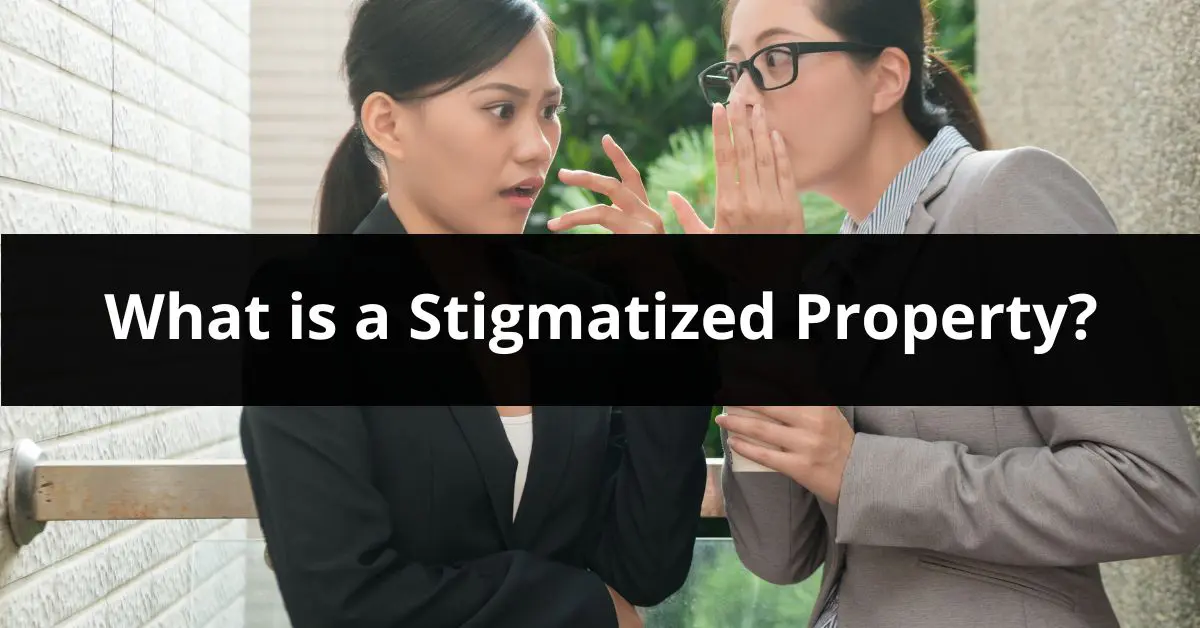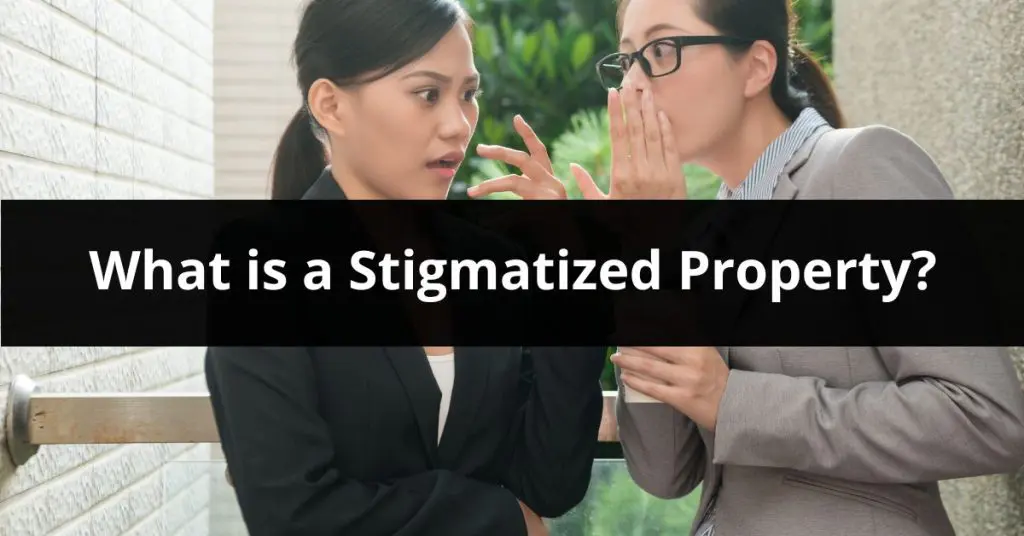A stigmatized property is a property that is shunned by buyers for reasons that aren’t related to the physical condition or features of the house or land.
The most common reasons a house becomes a stigmatized property include:
- Being the site of a murder or suicide
- Having ghost stories about the property
- A famous person previously owning the home
- Crimes or a known crime occurred
- Being Former drug lab
- Having environmental issues (like a house near the water contamination in Flint, Michigan)
- Being near a cemetery or a neighborhood with a high crime rate
- Films, TV shows and iconic images bring tourists and fans to the property
If you think your home is a stigmatized property, or it’s not selling because buyers believe it is one, don’t panic! You have options to remove the stigma and sell your house. And selling a stigmatized property is easy when you have a plan.
The first step is to learn about the types of stigmatized properties. Next put yourself in the buyer’s shoes. By doing this you’ll be ready address the buyers concerns, redirect the conversation to focus on the positives, and make the property less “stigmatic”.
Types of Stigma
There are several different forms of stigma.
Criminal stigma
Criminal stigma means that the property was used in the ongoing commission of a crime like a prostitution ring, drug den, chop shop, or other illegal activity. These criminal activities impact the public perception of the property, even if they were just rumors.
Debt stigma
Regular visits from aggressive debt collectors trying to collect on their lien, or loan sharks collecting on a debt can leave a home with a debt stigma. Even if you’ve left, collectors may still show up and harass whoever lives there now with illegal and/or aggressive tactics, and that will get around to potential buyers. Or worse, they can show up during an open house and this too spreads rumors.
Murder/suicide stigma
A natural death in a home is usually not enough to create a stigma unless the body goes undiscovered for a long period of time. However, if the death was a murder or suicide, the house usually becomes a stigmatized property. This is because a lot of people believe that trauma can linger long after someone has died.
According to Randall Bell (the appraiser from both Nicole Brown Simpson’s condo, Jon Benet Ramsey’s home, and other high profile cases), an infamous crime or murder in a home can result in a 10 – 25% loss in value!
Public stigma
Public stigma is when an event is known to a large number of people and any reasonable person can be expected to know about it. The Amityville Horror House and the home of the Menendez brothers are great examples of this type of stigmatized property.
Haunted or paranormal activity stigma
Many potential buyers don’t want to share their home with spirits, especially if they have children. While shifts in temperature, moving objects, or ghostly apparitions are fun at first, they can quickly become a nuisance that can make someone feel like they’re in danger.
The house doesn’t even need to be haunted either to have this stigma. Just stories about the house can give it this stigma.
Tip #1: Investigate other causes besides ghosts for so-called paranormal activity. Cold spots could be the HVAC installed incorrectly and strange noises could be plumbing or a pest infestation.
Tip #2: Damage by ghosts in your home may covered in a common “open perils” policy within in your home insurance if you need to make repairs due to them. You can also purchase paranormal activity insurance for an extra layer of protection.
Sex offender/Convicted felon stigma
Sex offender stigma can affect not only one property but an entire area/neighborhood. The sex offender doesn’t even need to be the owner/previous owner. Just having a sex offender living on the same block is enough to create a stigma for the entire neighborhood.
Famous stigma
Since movies and TV shows film inside of real homes and use them for exterior shots, the home can draw tourists and/or super fans of the show. This creates a famous stigma property.
For example, fans from the show “Breaking Bad” have actually tried to throw pizzas on top of the house used in the show (to reenact a scene from the show)! The new owner has since had to install a six-foot, iron fence around the property to stop people from constantly doing this! Sarah Jessica Parker showed up at the Sex in the City home and lined up shoes for her new clothing line which also brought unwanted attention.
Since people can view the types of stigmas very differently, let’s now focus on how stigmatized properties are different from regular properties.
How A Stigmatized Property Is Different From A Normal Property When Selling a Home
Property stigmas can be as unique as the home itself. Real estate best practices and state laws also affect how the different types of stigmas are handled during home sales.
The majority of states don’t require a seller to disclose any event that can stigmatize a property. But some states require disclosures like when you’re selling your house in California and a death (whether natural or not) occurs, and the death was due to the condition of the home like a carbon monoxide leak. We have a table below to show you examples by state.
Appraisals
The type of stigma determines whether or not it will affect the value of your property. For example, if your property was a former meth lab, it may be contaminated and an appraiser would take that into account and lower the value if you’ve not taken any mitigating measures.
According to a Wright State University study, on average, stigmatized properties are around 3% cheaper than regular homes.
Disclosure
Disclosure laws are not standardized, so whether or not you have to disclose anything about the stigmas on your property is determined by the state the property is in. Each state has its own unique set of disclosure laws.
Some state stigmatized property laws that stand out:
- California law requires that some deaths, including some from natural causes, which occurred in the home in the last three years be disclosed.
- In Illinois, realtors are required to disclose if the house was used to produce methamphetamines.
- Alaska state law requires the disclosure of human burial sites as well as disclosing any murders or suicides on the property in the last three years.
When asked, a real estate agent must disclose whether a property is stigmatized. Sellers must also honestly disclose if asked directly by a prospective buyer. However, sellers are not responsible for digging into a home’s history to find any past property stigmas. Buyers can also do their own research on sites that list properties where people died, searching obituaries for previous owners names, and crime databases to learn the history of a house.
This table will help you find the type of disclosure your state requires: *Accurate as of 9/7/22
| No Disclosures Required | Disclose if anyone has died in last 3 years in home | Disclose if home was used to manufacture methamphetamines | Disclose if there was any homicide, suicide, or felony that occurred on the property in the past 12 months. | |
| Alabama | X | |||
| Alaska | X | |||
| Arkansas | X | |||
| California | X | |||
| Colorado | X | |||
| Connecticut | X | |||
| Delaware | X | |||
| Florida | X | |||
| Georgia | X | |||
| Hawaii | X | |||
| Idaho | X | |||
| Illinois | X | |||
| Indiana | X | |||
| Iowa | X | |||
| Kansas | X | |||
| Kentucky | X | |||
| Louisiana | X | |||
| Maine | X | |||
| Maryland | X | |||
| Massachusetts | X | |||
| Michigan | X | |||
| Minnesota | X | |||
| Missouri | X | |||
| Montana | X | |||
| Nebraska | X | |||
| Nevada | X | |||
| New Hampshire | X | |||
| New Jersey | X | |||
| New Mexico | X | |||
| New York | X | |||
| North Carolina | X | |||
| North Dakota | X | |||
| Ohio | X | |||
| Oklahoma | X | |||
| Oregon | X | |||
| Pennsylvania | X | |||
| Rhode Island | X | |||
| South Carolina | X | |||
| South Dakota | X | |||
| Tennessee | X | |||
| Texas | X | |||
| Utah | X | |||
| Vermont | X | |||
| Virginia | X | |||
| Washington | X | |||
| West Virginia | X | |||
| Wisconsin | X | |||
| Washington, D.C. | X |
Many people wonder if a condemned house would be stigmatized. Good news, no, a house in bad shape does not make it stigmatized. There are ways to sell a home in poor condition as-is or do a quick curb appeal makeover to improve your chances of selling fast and the most amount of money.
However, if the home is being used for illegal activity, then that criminal activity will stigmatize it.
Tips to Sell a Stigmatized Property
There are several things you can do to sell your stigmatized property:
- Only disclose what the law requires, but be honest when asked about the stigma
- Embrace the stigma and market it as such (like if the house is haunted)
- Change the street address with your local zoning commission to remove the public stigma
- Only do showings by appointment to weed out the nosy people and thrill seekers
- Focus on the positives of the property like the newly remodeled bathroom and kitchen
- Sell your house for cash to a real estate investor like us
Whether your stigmatized property is from a murder or a ghost, you now know what is considered stigmatized property and the different types of stigma. If you’re selling a stigmatized property, check your state, city and county laws to double check what you need to disclose, and talk to your real estate agent for tips to sell your property. And if the property won’t move, or you need to sell fast, call us at (877) 804-5252 and we’ll be happy to talk.



